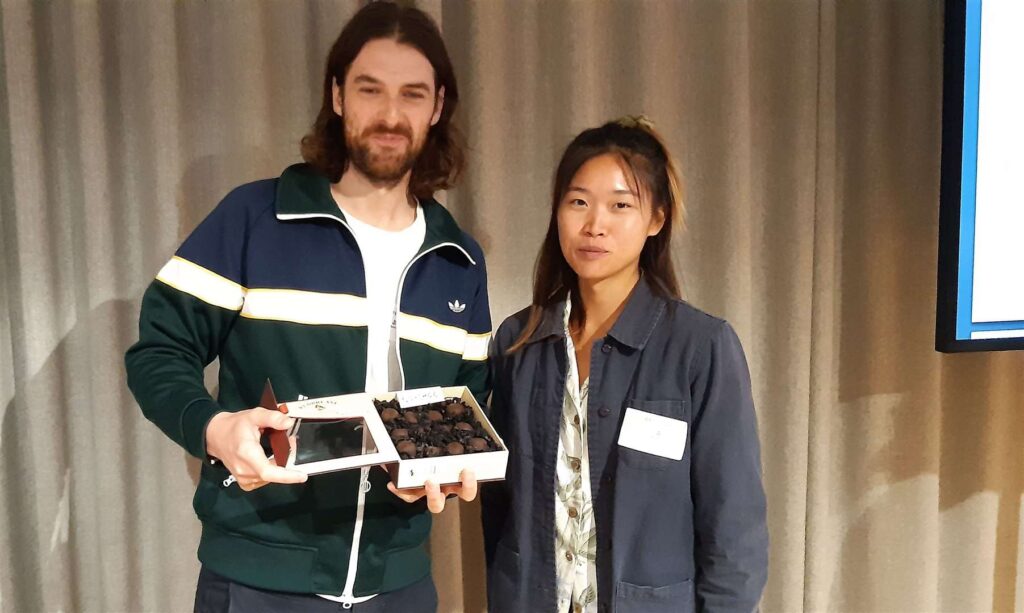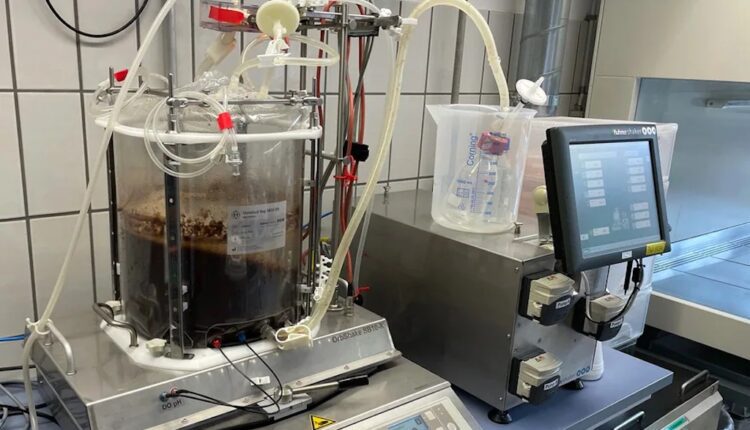They call it the future of chocolate.
It’s edible, melts, breaks, and even tastes like chocolate except it is grown in a food lab facility without using a single cocoa bean.
While the production of non-cocoa chocolate is still in its early days with only a handful of companies producing it, their assertions of being more sustainable and ethical could one day shake up the chocolate industry.
Given that 70% of the world’s cocoa comes from millions of smallholder farmers in Ghana and Côte d’Ivoire, what would the mass production of non-cocoa chocolate mean for their livelihoods?
Non-cocoa chocolate startups and their ambitions
“We will have an impact,” says Johnny Drain, co-founder of WNWN Food Labs, one of three recent startups actively producing and marketing non-cocoa chocolate.
Drain, who holds a PhD from Oxford University, sees as part of his marketing plan the need to address ‘vast inequities’ in the bittersweet world of chocolate.
The cocoa industry has been infamous for its non-sustainable practices, use of child labor and deforestation over the decades.
California Cultured, a startup company which uses cell culturing to create non-cocoa chocolate, is set to “welcome to a new age of sustainable and ethical chocolate.” And continues with “you deserve a delicious chocolate bar without guilt.”
Blue Horizon, an investment company with a mission to quicken the pace to sustainable food systems, has invested in California Cultured earlier this year.
Planet A Food, a new food science startup based in Germany states on their website, “We were dreaming about a chocolate for which no trees had to be cut down, no precious water was wasted, no fragile ecosystems were disturbed, and no child had to work.”
Drain describes himself as ‘the Walter White of flavor, ferments & food design,’ seeing himself as a renegade in the chocolate industry à la the main character in Breaking Bad.
But if he and the other startups succeed in mass producing cocoa-free chocolate in his laboratory, he may want to change his moniker to Willie Wonka.
“We are also already talking to consumers about what is wrong with most of the world’s chocolate,” says Drain. “The more consumers know about how products are made the more they will vote with their wallets.”
Drain already sold out of the first batch of his company’s non-cocoa chocolate prepared in May. He says another batch will be available in September.

Cocoa production in west Africa
The agricultural expansion of cocoa in Ghana and Côte d’Ivoire is the main reason both countries are losing their rainforests faster than any other country in the world, according to a recent study by The Rainforest Alliance. Côte d’Ivoire has an annual average loss of more than 200,000 hectares.
This is despite the fact that supply chain ruptures have affected this industry and global cocoa exportation is decelerating by 4.2% over the next four years, according to a recent market study.
These young companies of entrepreneurial food scientists are appealing to a consumer base that is socially conscious and expanding into a younger generation. But not all chocolate industry gurus agree with their approach.
“People have an emotional connection to chocolate that they don’t have to cornflakes,” says Clay Gordon, author of Discover Chocolate: The Ultimate Guide to Buying, Tasting, and Enjoying Fine Chocolate, and a renowned cocoa industry observer and consultant.
Yes, cocoa is responsible for some deforestation but Gordon says that “demonizing” cocoa production is not the reason to use advanced food science and technology to produce non-cocoa chocolate.
“Alarmist language does not help anyone,” says Gordon. “Cocoa farmers are barely earning a living as it is.”
Cocoa is especially vulnerable because it is predominantly grown by smallholder farmers. He says these farmers have no collective bargaining leverage and fair trade isn’t working to force major global companies to pay fair prices.
Gordon sees a market for lab-grown chocolate similar to the growing market for substitute plant-based meat products.
It is not competitive in the short term and hence will not have an immediate impact on the cocoa industry which many in west Africa depend on.
However, in the event of an unprecedented global climate event or “potential disruptors,” the rise in the use of lab-grown chocolate and other food products could be impactful.
“Climate change is a reality,” says Gordon. “The economics of doing this only makes sense if there is a wholesale decline of conventionally grown cocoa.”
How does cocoa-free chocolate taste?
Gordon has actually tried the cocoa-free bonbon chocolate produced by the Germany-based startup Planet A Food and admits that if he didn’t know it was grown in a lab, he would have thought it was real chocolate.
Maximilian Marquart co-founded Planet A Food earlier this year with his sister, Sara who is a food scientist.
Max, who has a doctorate in Material Sciences, has quickly moved the company past the research and development stage and is now scaling up for production and is partnering with food service organizations and supplying restaurants with their brand of non-cocoa chocolate, NOCOA.
“We can produce between 15 and 20 kilos a day at this point,” says Marquart. But they will soon be expanding their capacity to 400 kilos per hour, he says. Private investors, who are not directly tied to the cocoa industry are already in place, says Marquart.
“What we are aiming to do is create a second pillar next to cocoa for different applications,” says Marquart. He used the example of M&Ms saying why lab-grown chocolate couldn’t be used in them? “Cocoa-based products should be reserved for higher value applications.”
“Cocoa plants are a very special thing,” says Marquart. “I don’t think the demand for cocoa will ever be impacted by us.”
Marquart has considered building a laboratory in Accra, Ghana to use the large waste from cassava plants to provide feedstock for the fermentation process of NOCOA.
“Climate change threats are immense,” says Marquart. “It is something we all need to solve together.”
Mark Christian, founder and publisher of C-Spot, a consumer guide to premium and artisan chocolate, was somewhat surprised to hear of Marquart’s production projections.
Christian says the cocoa industry is approximately $125 to $135 billion a year from source to sale. Investing millions to process non-cocoa chocolate may become a necessity in the future in which both markets may be able to coexist, but there will be a jolt.
“It will take a while before lab-grown chocolate can take down the industry, but they are certainly on course and there will be a lot of people in the industry cheering them on,” says Christian.
- How Will Lab-Grown Chocolate Impact West Africa’s Cocoa Farmers? - September 3, 2022
